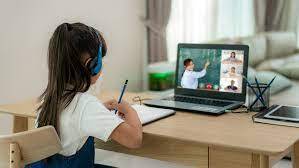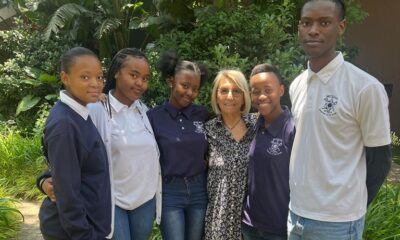
Matric

Massive change afoot in the hallways of education
Published
2 years agoon
One of the most deeply-felt reverberations of the pandemic has been on education. While students, teachers, and parents spent those long months of lockdown at home, the very foundation of education was being broken and put back together in new ways.
Traditional schooling is just one of many options that are opening up now and into the future.
A freelancer (speaking on condition of anonymity) who has been involved in a new local online high school that launched two weeks ago says 5 000 local and international students have signed up, and it has been a thrilling time for all involved.
“What school takes on 5 000 new students first time?” she asks rhetorically. She puts it down to technology, and says that “miraculously, there have been very few teething issues”.
“These parents and pupils are trailblazers, joining an online high school for the first time,” she says. The students are from all demographics, even from overseas. “They have to write final exams in person at exam centres, and these parents have said, ‘That’s fine, we’ll fly our kids in!’”
Many of the students are pupils whose lives no longer align with traditional schooling. They could be kids whose parents travel a lot, children who do sports or hobbies which take up a lot of their time, those who are marginalised in some way – for example, LGBTQI+ (lesbian, gay, bisexual, transgender, queer, and intersex) teens – or kids who were being home-schooled.
The many jobs a teacher does in a traditional school are now divided up amongst a number of professionals – one designs the course, one teaches, one is in charge of the child’s emotional well-being, and there’s even one person who just focuses on marking and remediation.
Online school is for students who are able to work independently and are self-motivated, she says. “You can work at any time of the day or night, from anywhere, but you have to put in the work and be in charge of your own education. There’s only so much the school can do. It’s all online – there are no live classes. All the lessons are animated and pre-made. Then there is weekly moderation to ensure students are keeping up. If not, they attend small live group sessions or one-on-one sessions with support coaches. The lessons are interactive, with videos, multiple choice questions, and so on.”
There are many advantages to online high school, including working at your own pace, finishing a term early, getting used to the independent learning of university, and surprisingly low fees.
Being part of something so revolutionary is “sometimes cool and sometimes scary”, she says. At this stage, there’s no matric offering as a school can offer matric only after being established for a year. But she notes that online schools are becoming a phenomenon worldwide and will become just one option of many in the years to come.
Caryn Gootkin was one of the early adopters of online school for her son (16). Her daughter still goes to a traditional Jewish school. “It’s a fully purpose-built online high school. We started just before the pandemic,” she says. “My son was part of the first cohort. He joined in junior high, which is an 18-month international qualification. They follow a United Kingdom curriculum.
“It suited us. My son’s temperament wasn’t suited to a brick-and-mortar school. He’s much happier working on his own from home. It gives him lots of flexibility. It’s not home-schooling – I have no part in his education. They’ve got their online classroom, he has live lessons every day, he has classmates and teachers – the only difference is that they’re each sitting in their own location.”
For Amanda Weltman, home-schooling became part of the way her family navigated the rollercoaster of the pandemic. When the leadership of her children’s Jewish school announced in mid-2020 that they were closing at the end of the year, she decided to home-school her sons (then in Grades 2 and 3) for the next two terms.
“We registered them with the Department of Basic Education as home-schoolers. We followed our own curriculum although we also had lists to track what they needed to learn. They started school at the beginning of 2021. We then home-schooled them again for some of the third term. This was because the Delta variant was circulating, and I was in my third trimester of pregnancy [so it was safest]. This time, the school provided the curriculum. They went in for tests. They did really well, and it was a smooth transition back to school.
“It’s been lovely home-schooling them and in an ideal world, I would have been happy to home-school them permanently,” she says. “But because my husband and I both work full-time, it would have been too demanding to put in the full energy required. I also think it’s important for them to be exposed to other peers, adults, social activities, and sport. As much as I loved teaching them, I want to keep my ‘mom’ role as my primary role!” Her children have had private lessons with a local rabbi to ensure continuity of their Jewish education.
She notes that “there’s a huge home-schooling community and always has been. It’s obviously growing even more now.”
David Jacobson and Heidi-Jane Esakov-Jacobson have always educated their son at home. “We have never sent our six-year-old to school, but always had the intention – at some stage – to send him. The longer we delayed sending him to school, the more we realised that we didn’t want to rely on the schooling system to be a primary source of his educational and social values. At the same time, we witnessed the enormous value of our approach, and now we are questioning whether we would even consider traditional schooling.
“We’re not ‘traditional’ home-schoolers, but rather have loosely followed an approach known as ‘unschooling’,” they say. “This approach essentially values self-directed learning, particularly through unstructured play, with a strong focus on nature and innate trust in a child’s capacity and desire to learn. This has allowed us to follow our son’s interests and nurture his curiosity instead of imposing on him what we think he should learn. In an odd way, COVID-19 seemed to endorse our home-schooling journey. The ‘unschooling’, nature-based approach we have followed has meant that our son has had an enormous sense of freedom over the past two years.
“COVID-19 also revealed how many incredible resources are available online. Our primary challenge has been socialisation, and we have attempted to counter this through regular meet-ups with other families following a similar philosophy to ours as well as through extra-mural activities such as Forest School, which he attends weekly.
“Another challenge has been his Jewish education. We understand that we will need, at some stage, to outsource parts of his Jewish education. However, in our home, Judaism plays a central role in terms of how we think about the world. We encourage our son to grapple with concepts such as what Hashem is, what Hashem wants from the Jewish people, and what our role and responsibility as Jews is.”
Technology has been one of the forces that have heralded this education revolution. But according to local tech expert Arthur Goldstuck, “there are two sides to this coin. If you have good connectivity and a teacher who understands how to make it work, then it’s not difficult to make the transition. But large sectors of our population don’t have that.”
He says teaching with technology requires a whole new methodology that needs to be taught – to teachers. “Teachers aren’t properly trained in how to use technology and teach remotely. They continue using the same style, techniques, and content that they do in a regular classroom. But it should be blindingly obvious to educators that they need to adapt their style and content in a virtual environment.”
Another issue is that “children have to develop both the skills and mindset to learn in this environment. But if you are geared for online learning, incredible new opportunities are opening up.”
Still, he thinks that the average South African family won’t jump on the alternate education train just yet. “The typical family will prefer physical school for social interaction, sport, and needs like a Jewish education. In the longer term, there will probably be a move to a true ‘hybrid’ education, where kids attend school but also learn virtually.”
He emphasises that “the most important attribute for the future is to be flexible to new ways of doing things. Don’t try to hold onto outmoded ways of thinking.” He predicts that people will turn to online courses and learning throughout their careers to continue up-skilling and adapting to a changing world.










